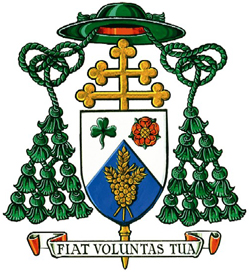Homily
[Exodus 19:1-6a; Psalm 100; Romans 5:6-11; Matthew 9 :36-10 :8]
Over the last number of weeks, the attention of our province, country and even world has been drawn to the extraordinary number and size of wildfires that have been impacting Alberta and other regions of Canada. When they flare up, these fires are a clear and present danger, seriously threatening life, property, industry, and atmosphere. Countless firefighters have sprung into action in response to the threat, among them now many who have recently arrived from abroad.
Behind the scriptural texts we have for this mass is another clear and present danger, one menacing all of humanity by threatening not only our present but also, and far more importantly, eternal lives. The danger is that posed by humanity’s sinful rebellion against God. A review of history and contemplation of our own present experience demonstrate with striking clarity the devastating impact on human life and community that occurs when we presume to take the place of God. The biblical readings speak of God’s response to this threat. They tell us that God acts, jumps to our rescue, to end the destruction and bring His people back to the way of living God intended for us from the beginning.
The setting for the first reading is the exodus from Egypt of the Israelite people. Slaves in that country, they had heard and responded to God’s evacuation order, given through Moses, to leave captivity and journey under His care through the desert to the promised land. In the text for today, God, again speaking through Moses, reveals His motivation. The divine will is to form a people, His people, as a “treasured possession”, bound together in a covenant of reciprocal love, to which God pledged Himself irrevocably.
While God was always faithful to this covenant, His people were not, and the danger continued to spread rapidly with great force. God did not abandon the rescue effort. In the second reading we hear Saint Paul speak of God’s greatest intervention of all to save us from the danger: the gift of His own Son. We can sense, coursing through the text, Paul’s thanksgiving and awe at the wondrous love of God motivating the rescue. “God proves His love for us,” Paul says, “in that while we were sinners Christ died for us.” God does not stand aloof from the suffering of His people, even when the danger is self-inflicted by our sin against Him. He loves us beyond measure, and His heart is deeply moved by our plight, especially since we are helpless to save ourselves.
We see the divine compassion on display in the passage from Saint Matthew’s Gospel. There we hear that the sacred heart of Jesus was moved by the suffering he saw among the people, that he “had compassion” for the crowds, “harassed and helpless” as they were for lack of leadership. Jesus saw the clear and present danger. His own response, we know, was his definitive act of rescue on the Cross. What is highlighted in this particular text is his call to others to join him in the rescue effort. It recalls his choice of the first apostles and the mandate he gave them to go into the world and proclaim the nearness of the kingdom of heaven, to announce, in other words, that God is at work to liberate us from the danger of rebellion and restore us to His covenant of love, the “place” where we are always safe.
That call from the Lord is not limited to the first apostles. It extends to everyone who has become his disciple through Baptism. To be a disciple is to be missionary, a participant with Christ is his own work of rescue. The clear and present danger facing humanity remains, flaring up, often with great intensity, whenever the human will presumes to direct and impose itself rather than be governed and led by God’s loving design for humanity. We, too, like the apostles, are invited by the Lord to confront the danger by our witness to the saving love of God at work in our own lives.
I have been deeply impressed and enormously edified by the brave firefighters battling the conflagrations that threaten us. At great cost to themselves, they are expending enormous effort, which often leaves them exhausted. Likewise, I am very grateful for the many devoted Catholics of this Archdiocese, disciples of the Lord, stepping up for service in our Archdiocesan offices, parishes, associations, and institutions in response to the mandate we have all received from the Lord. The work to which we are called can also be very tiring, particularly if we feel rejected by the very world we seek to serve and heal. We may not be called upon to put out fires, but it is incumbent upon us to remain “fired up” for the mission. When we, like Saint Paul, are seized with the truth of God’s love revealed in the death of Christ, there arises within us a gentle yet powerful flame of answering love, which continually moves and energizes us to pursue the rescue effort.
Here in this celebration of the Eucharist that divine love touches us anew. May the love of Christ spark within us renewed zeal for our mission to announce him as the only true rescuer from the dangers that beset us.
Most Reverend Richard W. Smith
Saint Joseph Basilica
June 18th, 2021

